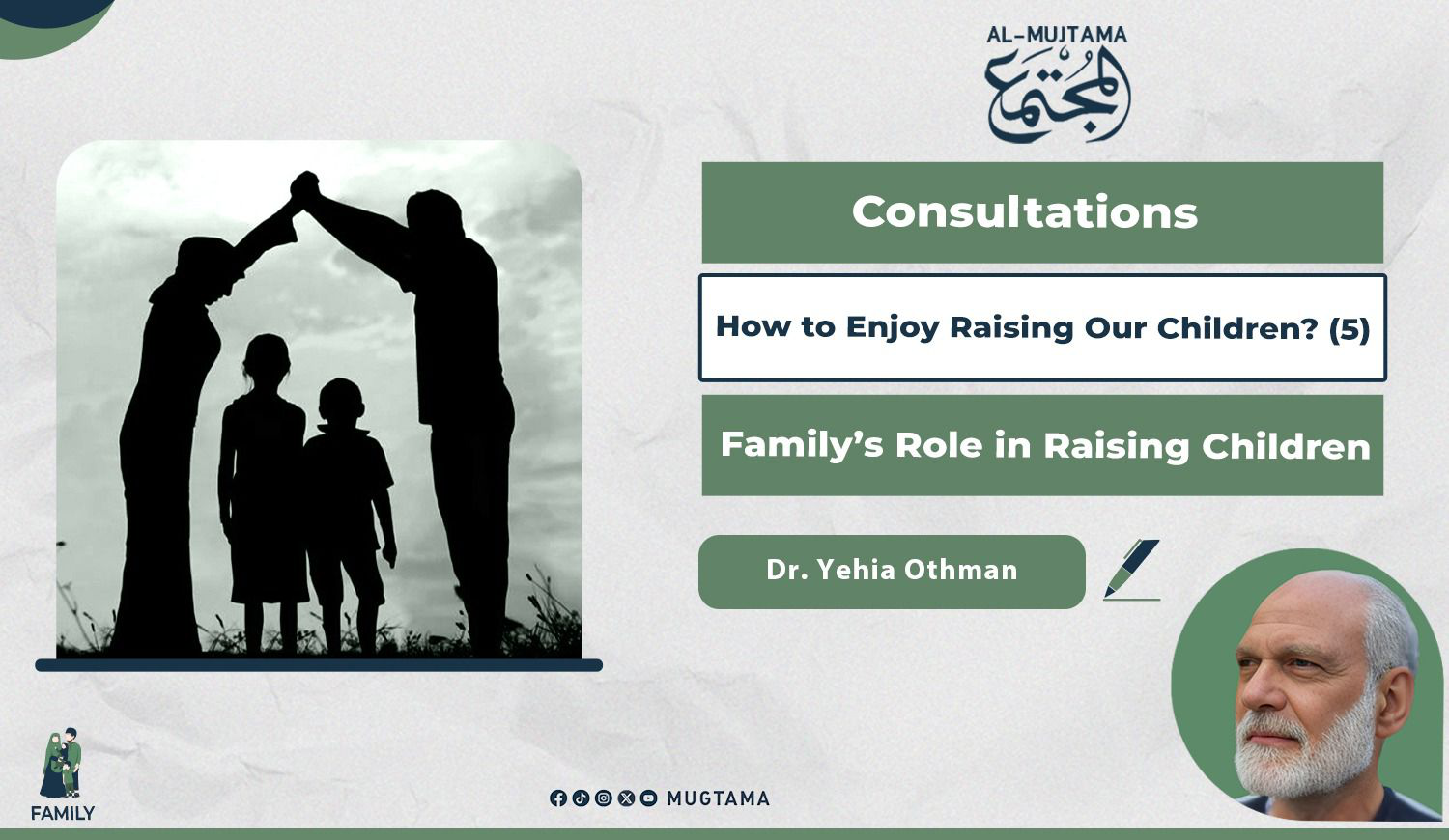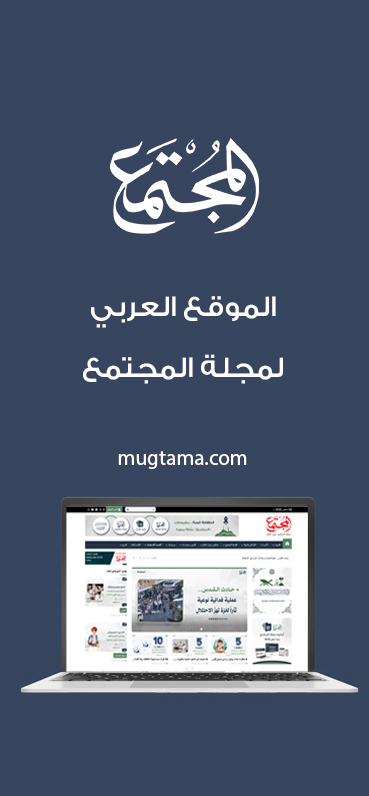Consultations
How to Enjoy Raising Our Children? (5) Family’s Role in Raising Children

This is the fifth article in the
series “How to Enjoy Raising Our Children?”, where
we’ll discuss the educational environment (B):
The Importance of the Family’s Educational Role
The Muslim family plays the most important and influential role in raising
children. A child will not go to the mosque and benefit from its educational
values unless his father takes him to the mosque from a young age. But if the
father neglects the value of taking his child to the mosque, or if
he himself does not usually pray in the mosque, this weakens the mosque’s role
as an educational institution contributing to upbringing.
The same applies to schools. With
the wave of Westernization that
began more than a century ago, foreign schools became the strongest
academically, especially with their focus on foreign languages and the opportunities that brings in life, in addition to the
psychological drive of belonging to the elite class in society.
The poisonous ideologies, the
Western lifestyle with all its drawbacks, detachment from Islamic values—even
while maintaining the outward forms of worship—along with the secular influence
on national schools, both public and private, have negatively affected the
concept of education based on value. In contrast, materialistic values have prevailed.
Amid all this destruction under
the so-called “education reform,” there have been noble efforts to establish
Islamic schools that adopt the latest educational methods and techniques based on Islamic values. This highlights the family’s role in choosing a
school that builds rather than destroys. A school that, together with the
family, raises a generation strong in faith and proficient in modern sciences,
becoming a true added value to the Ummah.
Yes, Islamic schools have not yet
spread enough to meet demand, and they are expensive because they do not
receive government support. To address this challenge, there are two solutions:
1.
Homeschooling: Families
with children in the same grade can form study groups and hire educational
specialists to teach them Islamic upbringing alongside the accredited
curricula. This can be done by renting a place or rotating between students’
homes.
2.
Public Schools: Provided
there is daily follow-up, and we emphasize again: daily follow-up, with the
children to review and correct any negative values.
Therefore, parents’ awareness of
the role and impact of schools in reinforcing Islamic values is what drives
them to choose the right school. Their role extends further to monitoring and
evaluating this important role.
The Role of Companionship in Raising Children
The Prophet (peace be upon him)
said: “The example of a good companion (who sits
with you) in comparison with a bad one, is like that of the musk seller and the
blacksmith's bellows (or furnace); from the first you would either buy musk or
enjoy its good smell while the bellows would either burn your clothes or your
house, or you get a bad nasty smell thereof.”
He also said: “A man follows the religion of his
friend; so each one should consider whom he makes his friend.”
The Prophet (peace be upon him)
thus explains to us the good effect of righteous companionship and the harmful
effect of corrupt companionship, and why a Muslim must ensure his companions are
righteous, helping him in his worldly affairs while reminding him of the
Hereafter.
One of the important
responsibilities of parents is to create a good environment through which their
children can choose good friends. Parents should build relationships with righteous families
whose children can be friends with theirs. They should also teach and train
their children on how to choose friends, get to know their children’s friends
and their families, praise children for having good companions, and convince
those with corrupt friends to end their relationship, because your companion
pulls you along!
Media in Children’s Upbringing
With digital media and social
networking, “the media” has
become one of the strongest factors shaping our children’s culture and values,
with both positive and negative effects. Our ability to monitor our children
has decreased, while their ability to hide their involvement in this vast
network full of both good and evil has increased.
Therefore, one of the most
important roles of education that the family, the school, and the mosque must
fulfill is creating motivation for the proper use of the internet.
Internet use has become a distinct
feature of this era and cannot be blocked from children. However, it can be
regulated by instilling in them the fear of Allah and reminding them of the meaning of Ihsan: “Ihsan is to worship Allah as if you see Him, and if you
do not see Him, then indeed He sees you.”
Children should also be trained to worship Allah by using the internet
to grow in Islamic knowledge, to witness glimpses of the Power of Allah, to
engage in advocacy, and to join beneficial virtual Islamic and academic
communities around the world.
Thus, the effect of digital media
and social networks on our children goes back to the family’s role in
education. Families that give mobile phones to children or allow internet
access at home without supervision bear a grave sin and carry the burden of their
children’s misguidance, failing to act upon the verse: {O
believers! Protect yourselves and your families from a Fire whose fuel is
people and stones, overseen by formidable and severe angels, who never disobey
whatever Allah orders—always doing as commanded.} [At-Tahrim 66:6]
The Central Role of the Family in Upbringing
Despite the value and importance
of other influential factors in upbringing after the family, namely the school,
the mosque, companionship, and the media, we reaffirm that the family’s role
remains the most influential. The family’s role
is not only in directly raising the children but also in how it deals with
these other educational factors. Depending on the family’s role, these factors
can have either a positive or a negative impact.
No one can influence your child
except to the extent that you are negligent or careless. We cannot claim that
the internet corrupted our children while we gave them phones without ensuring
their self-control and religious awareness, without monitoring their behavior,
or without discussing their interests and online activities openly.
We cannot claim that our children
are lazy to attend the mosque if we never instilled love for the mosque in
them, never took them there in childhood, or never modeled that behavior ourselves.
We cannot claim that bad friends
destroyed our child if we did not prepare a healthy social environment for good
companionship, if we failed to know their friends and families, or if we
ignored their negative behavior without investigating and correcting it.
We cannot claim that our children
no longer enjoy outings with us or even our company at home if we never built a
friendship with them or gave them space to express themselves.
We cannot claim that schools
filled them with un-Islamic ideas and values if we ourselves enrolled them in
foreign or secular schools (even if out of necessity), and yet failed to
monitor their behavior and correct what needed correction.
Mosque
The mosque once played an active
role in upbringing, being an influential educational hub for instilling
knowledge, practicing religious values, and reinforcing faith. Its role
complemented that of the family. Unfortunately, in most Muslim lands today, its
role has been reduced to only hosting prayer.
School
Schools were never limited to
academics alone. In most Muslim lands, they were once under the Ministry of
Education—a name reflecting their great educational mission. But corrupters
sought to destroy this great institution through what came to be called
“education reform,” which in reality was Westernization and erasure of Islamic identity from our schools.
Media
Media was once just a newspaper
and a radio. Today it has become a vast web, an enormous ocean of information
with extreme variations in credibility, topic, and source. Its greatest danger
lies in its lack of transparency—in other words, darkness. Dealing with the
internet without discipline is like entering a dark room: without guidance, a
child is bound to stumble. If we do not raise our children with the right
principles for dealing with the internet and assess their behavior, we risk
losing them.
Companionship
A new form of companionship has
appeared through the internet—completely unknown friends from all over the
world! This too must be managed by teaching children the right principles of
online behavior.
You Can Also Read:
- Parental Model Challenges in the Age of Social Media
- Islamic Education Curricula: Reality and Aspirations
- How Fiqh Education Reforms the Muslim Personality?
-------------------------------------------------------------











